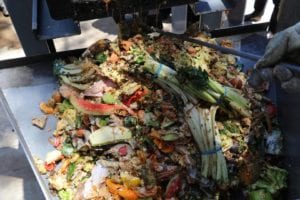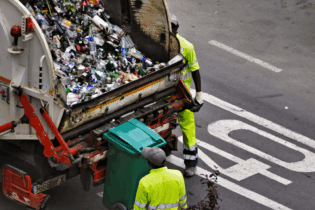With only six years of municipal landfill airspace left, Johannesburg is staring down the barrel of a wheelie bin. While the city implements programmes to reduce reuse and recycle, industry experts ask: Are we doing enough to curb the amount of organic waste going to landfill?
By Liesl Frankson Gavin Heron, co-founder of Earth Probiotic, believes that more needs to be done. “In terms of the current status of household food waste disposal in South Africa, nothing is happening on a formal basis. There are those proactive individuals who see the benefit of composting their food waste, but the sad reality is that most organic waste ends up in landfills,” he notes. According to an audit by the CSIR, 40% of all waste going to landfills nationally is organic. Heron points out that promoting the diversion of food waste from landfill is important for a number of reasons, chief among them the fact that we are fast running out of landfill space. “As landfill airspace dwindles and becomes a scarce commodity, we can expect the cost of waste disposal to increase significantly. Constructing new landfills is expensive and these will no doubt be built further away from our expanding cities, which will further drive up the cost of waste disposal,” he says. Not only is diverting organic waste away from landfill important to help delay Landfill Zero, it is essential to prevent adverse environmental effects. “When organic waste is landfilled, it rots and produces methane. This methane is 22 times more damaging to the environment as a greenhouse gas than carbon dioxide. This makes it difficult to meet our climate change obligations. It also attracts pathogens, and produces leachate that will eventually pollute our increasingly scarce water sources,” Heron adds.A costly crisis
To address these concerns, Heron believes a critical change is needed in the messaging around food waste and its diversion from landfill. “At the moment, food waste minimisation tends to focus on environmental or green issues. First, we need to focus on the costs of that waste, the hygiene issues, and the risks associated with food waste. Food waste is expensive to discard for any business. “Research by Dr Suzan Oelofse at the CSIR has directly measured the cost of food waste to our economy at over R10 billion per annum.” To cut the cost of food waste disposal in commercial kitchens,Heron suggests on-site composting. On-site composting solutions are an easy, malodour-free way of managing food waste with the benefit of producing a valuable useful output. “Key to this is in-kitchen separation, which not only increases dry recycling volumes by upwards of 30% but also enables waste volume measurement and reduces contamination,” Heron explains. “We measured that food waste composting activities reduced food costs by 4.2% and kitchen consumables by 11.8%.So, looking at the messaging and motivation for composting and diversion of food waste from landfill, it makes business sense first and environmental sense after that.” For commercial kitchens, composting food waste on-site can reduce their total waste bill, and give these kitchens financial predictability going forward, which is essential for budgeting purposes. In addition to this, legislation is on the way that will ban food waste from the general waste stream.
“Cape Town and Johannesburg are already focused on reducing organic waste to landfill by 50% by 2022, leaving commercial and household kitchens with only three years to solidify a plan to deal with their food waste. Composting organic waste is a strategy that will not only protect the environment, but ensure that you, or your company, are ahead of the coming tsunami of regulations that will turn your food waste to landfill practice into an almighty problem,” Heron insists.





